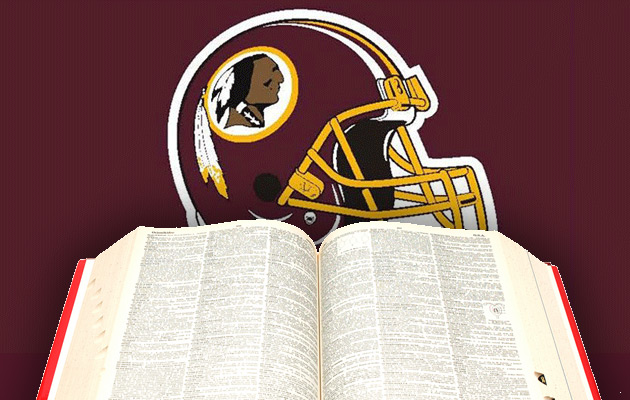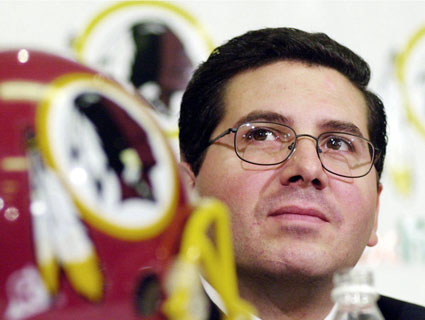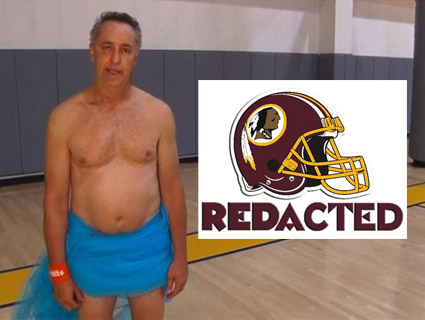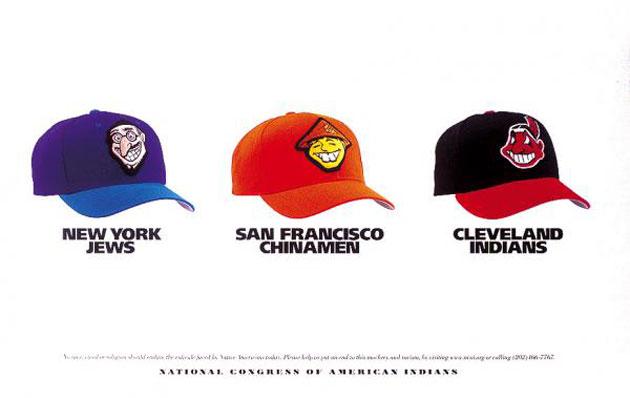
Courtesy National Congress of American Indians
On October 30, representatives from the Oneida Nation met with NFL higher-ups in New York City to discuss the Washington pro football team’s offensive name—another in a series of moves to pressure the franchise to change its name and mascot. After the meeting, Oneida representative Ray Halbritter said, “Believe me, we’re not going away.”
But with everyone from President Obama to Bob Costas weighing in on the [Redacted], it’s worth remembering that this issue didn’t start when owner Dan Snyder said that’d he’d “never” change the name—and that it’s not limited to one team. Here are some key moments in the history of racially insensitive sports mascots:
|
1890 |
The word “redskin” first appears in a Merriam-Webster dictionary. Eight years later, Webster’s Collegiate Dictionary notes that the term is “often contemptuous.” |
|
1915 |
The first incarnation of baseball’s Cleveland Indians forms. “There will be no real Indians on the roster, but the name will recall fine traditions,” the Cleveland Plain Dealer wrote at the time. |
|
1922 |
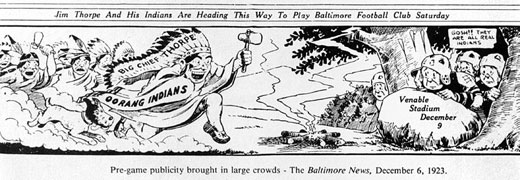 Oorang Dog Kennels owner Walter Lingo founds the Oorang Indians, an NFL team made up entirely of Native Americans and coached by Jim Thorpe. The team’s popular halftime shows feature tomahawk-throwing demonstrations and performances from Lingo’s prized Airedale terriers. |
|
1926 |
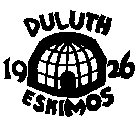 The Duluth Kelleys pro football team changes its name to the Duluth Eskimos. |
|
1933 |
The Boston Braves changes its name to the Boston [Redacted]. According to the Boston Herald, “the change was made to avoid confusion with the Braves baseball team and the team that is to be coached by an Indian.” (The coach, Lone Star Dietz, might not have been Native American.) |
|
1934 |
The Zulu Cannibal Giants, an all-black baseball team that played in war paint and grass skirts, barnstorms around the country. Six years later, the Ethiopian Clowns continue the tradition of mixing baseball with comedy to appeal to white audiences. |
|
1951 |
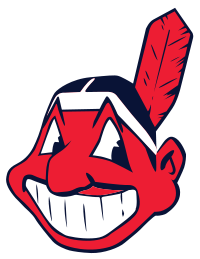 Sportswriters dub the Cleveland Indians’ new red-skinned Native American logo “Chief Wahoo.” The caricature is inexplicably still in use today. |
|
1961 |
Stewart Udall, John F. Kennedy’s interior secretary, threatens to take away the Washington football team’s federally owned home stadium due to owner George Preston Marshall’s refusal to sign a black player. Despite support from members of the American Nazi Party, Marshall begrudgingly signs a handful of black players for the 1962 season, making Washington the last team in the NFL to integrate. |
|
1962 |
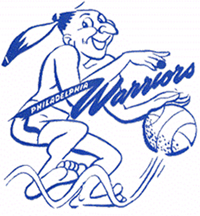 The Philadelphia Warriors basketball team moves to San Francisco, changing its Native American caricature logo to a plain headdress. In 1969, the imagery is dropped altogether in favor of a Golden Gate Bridge logo. |
|
1967 |
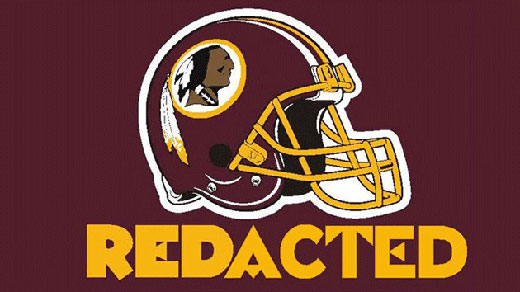 The Washington [Redacted] registers its name and logo for trademarks. |
|
1972 |
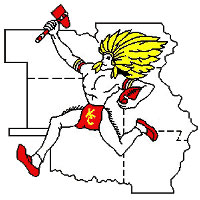 The Kansas City Chiefs drop their Indian caricature logo, replacing it with the arrowhead still in use today. |
|
1975 |
St. Bonaventure University drops the name Brown Squaws for its women’s teams when, as one former player put it, “a Seneca chief and clan mothers came over from the reservation and asked us to stop using the name, because it meant vagina.” Seventeen years later, men’s and women’s team names are officially changed from the Brown Indians to the Bonnies. |
|
1978 |
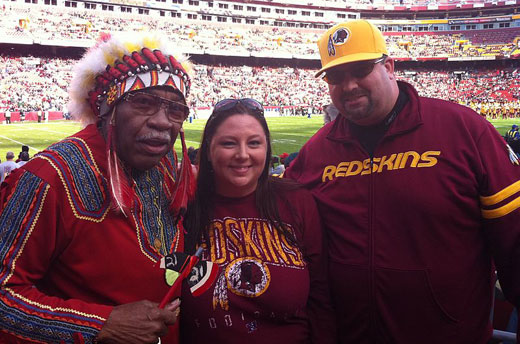 Washington [Redacted] fan Zema Williams, who is African American, begins appearing at home games in a replica headdress. “Chief Zee” becomes an unofficial mascot. “The older people been watching me so long, they don’t even say ‘Indian,'” Williams told the Washington Post. “They say, ‘Injun. There’s my Injun.'” He still goes to games in his regalia. |
|
1978 |
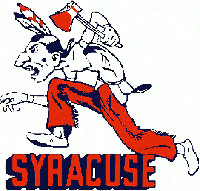 Syracuse University drops its Saltine Warrior mascot—a costumed undergrad—and iconography after Native American students call the character racist and degrading. |
|
1986 |
The Atlanta Braves retire “Chief Noc-A-Homa,” a man in Native American dress who would emerge from a tepee in the left field bleachers to dance after a home run. Levi Walker, a member of the Traverse Bay Bands of Odawa Indians and the last man to play Noc-A-Homa, said the Braves were “overly sensitive about being politically correct.” |
|
1992 |
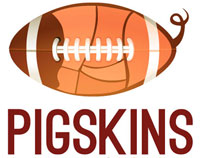 Washington Post columnist Tony Kornheiser writes that “it’s only a matter of time until ‘Redskins’ is gone.” He suggests the team change its name to the Pigskins. (In 2012, a Washington City Paper poll asks readers to vote for a new team name; “Pigskins” wins with 50 percent of the vote.) |
|
1994 |
Marquette University and St. John’s University both change their Native American mascots. Marquette’s Warriors become the Golden Eagles; St. John’s Redmen become the Red Storm. |
|
1995 |
The Redskins unveil a special mascot for the 1995 Pro Bowl. It is quickly retired. |
|
1997 |
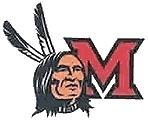 The Miami (Ohio) University Redskins become the RedHawks. |
|
2001 |
The National Congress of American Indians commissions a poster featuring a Cleveland Indians Chief Wahoo baseball cap alongside those from the (imaginary) New York Jews and San Francisco Chinamen. The ad goes viral in 2013 when the [Redacted] controversy heats up again. |
|
2003 |
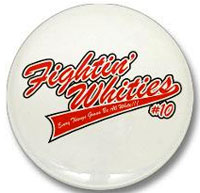 The University of Northern Colorado’s satirically named Fighting Whites intramural basketball team uses $100,000 from merchandise sales to create a scholarship fund for minority students. |
|
2005 |
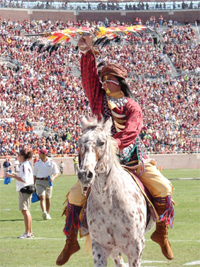 The NCAA grants Florida State University a waiver to continue using its Seminoles nickname and iconography largely due to support from the Seminole Tribe of Florida, which maintains a friendly relationship with the university. |
|
2012 |
A leaked Atlanta Braves batting-practice cap features the decades-old “Screaming Savage” logo. After a public outcry, it never makes it to stores. |
|
May 2013 |
[Redacted] owner Dan Snyder tells USA Today that he’ll never change his team’s name: “NEVER—you can use caps.” Ten members of Congress, including Native American Tom Cole (R-Okla.), sign a letter urging Snyder to drop the R-word: “Native Americans throughout the country consider the term ‘redskin’ a racial, derogatory slur akin to the ‘N-word.'” NFL commissioner Roger Goodell responds that the team’s name is “a unifying force that stands for strength, courage, pride and respect.” |
|
July 2013 |
A resolution by the Inter-Tribal Council of the Five Civilized Tribes states that “the use of the term ‘Redskins’ as the name of a franchise is derogatory and racist” and that “the term perpetuates harmful stereotypes, even if it is not intentional, and continues the damaging practice of relegating Native people to the past and as a caricature.” |
|
August 2013 |
Slate, The New Republic, and Mother Jones decide to stop publishing the team’s name. In the following month, MMQB.com‘s Peter King, ESPN’s Bill Simmons, and USA Today‘s Christine Brennan follow suit. |
|
September 2013 |
Appearing on a DC sports radio program, Goodell says of the [Redacted] name, “If one person is offended, we have to listen.” |
|
October 2013 |
Obama tells the Associated Press, “If I were the owner of the team and I knew that there was a name of my team—even if it had a storied history—that was offending a sizable group of people, I’d think about changing it.” In a letter to season ticket holders, Snyder insists that the name “was never a label. It was, and continues to be, a badge of honor.” And, at the end of the month, the Oneida ask to meet with all 32 NFL owners during Super Bowl week:
|
|
January 2014 |
ThinkProgress publishes an exhaustive account of the fight to rebrand the slur, revealing that the Washington team consulted with Republican advisers—including GOP messaging consultant Frank Luntz, former George W. Bush press secretary Ari Fleischer , and former Virginia governor and US Sen. George Allen—on how to handle criticism of the team’s name. Then, during a pre-Super Bowl press conference, Goodell is asked if he would ever call a Native American the name of Washington’s team. Goodell hedges, saying the name has been “presented in a way that honors Native Americans.” Meanwhile, the National Congress of American Indians releases this video the week of the big game: |
|
March 2014 |
In a letter to “Everyone in Our Redskins Nation,” Snyder claims that, after visiting 26 tribal reservations in 20 states, “it’s plain to see they need action, not words.” So a change to the team’s name is finally in order? Nope. Instead, Snyder announces the creation of Washington Redskins Original Americans Foundation, whose mission is “to provide meaningful and measurable resources that provide genuine opportunities for Tribal communities.” The letter touts a number of projects already completed, including distributing 3,000 cold-weather jackets to tribes during the bitter winter and purchasing a new backhoe for the Omaha Tribe in Nebraska. The team’s name, however, will remain the same. Read the full letter here:
|
|
June 2014 |
The US Patent and Trademark Office canceled six Redskins trademarks, ruling that the name is “disparaging to Native Americans.” (Federal law prohibits the protection of offensive and/or disparaging language.) The decision marked the second time that the team lost its trademark protections, though the first ruling, made in 1999, was overturned in federal court in 2003. The Redskins will certainly appeal the Patent Office’s decision; during that time—which could last years—the team will retain its trademark protection. Read the full ruling here, and be sure to check out some of the images presented as evidence by the plaintiffs, including this one: 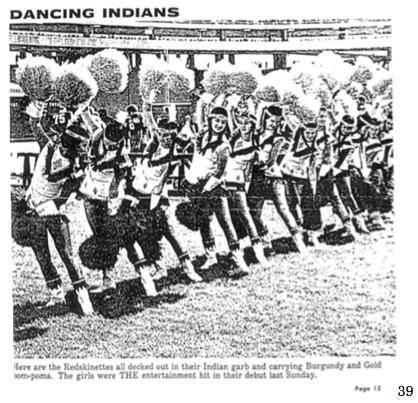
|

